By James Sutherland on SwimSwam
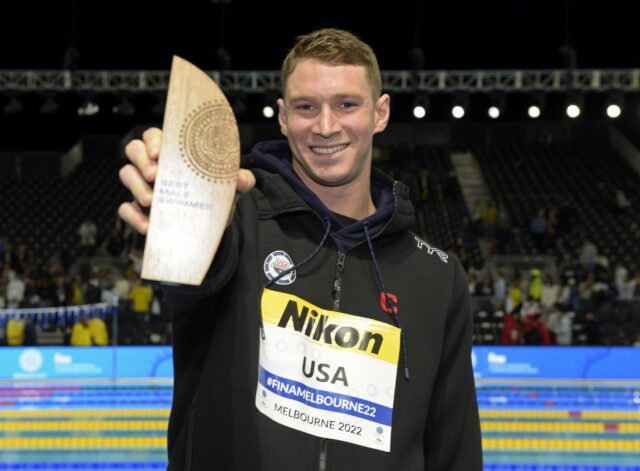
2022 FINA SHORT COURSE WORLD CHAMPIONSHIPS
- Tuesday, December 13 to Sunday, December 18, 2022
- Melbourne Sports and Aquatics Centre, Melbourne, Australia
- SCM (25m)
- Prize Money
- Meet Site
- Meet Schedule
- How To Watch
- Meet Roster Index
- Psych Sheets (Updated)
- Live Results
Swimmer Of The Meet: Ryan Murphy, USA
American superstar Ryan Murphy went on an absolute tear at the Short Course World Championships in Melbourne, winning five gold medals and one silver to earn Male Swimmer of the Meet honors.
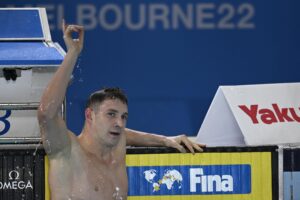
Ryan Murphy courtesy World Aquatics
Murphy became the first swimmer to sweep the men’s backstroke events at the championship since the 50-meter event was introduced in 1999, roaring to victories in the 50 back (22.64), 100 back (48.50) and 200 back (1:47.41), setting a new Championship Record in the 100 as he came within 17 one-hundredths of the world record.
His victory in the 50 back didn’t come without controversy, as the final had to be re-swum after a technical error resulted in three swimmers pulling up and not completing the initial event. Murphy had been beaten head-to-head by Australian Isaac Cooper in the first race, but topped him by nine one-hundredths of a second in the re-swim.
Murphy also led off in a blistering 22.37 to help propel the American squad to a new world record in the mixed 200 medley relay (1:35.15), a 50 back time that is well under his American Record of 22.53 (though it won’t be an official record since it was done in a mixed event).
The 27-year-old finished the meet off by leading the U.S. to a joint gold and world record performance in the men’s 400 medley relay, as the Americans and Aussies finished in a dead heat for first in 3:18.98.
Murphy added a sixth medal on the men’s 200 medley relay, beating Cooper head-to-head after the 50 back controversy (22.61 to 22.66) as the U.S. team finished second behind the Italians and set a new American Record of 1:30.37.
Honorable Mentions:
- Nic Fink (USA) – Fink successfully defended his world title in the men’s 50 breast, setting a new Championship and American Record of 25.38, and he also won the 100 breast crown for the first time over an elite field in a time of 55.88. He won silver in the 200 breast, setting a new American Record of 2:01.60, and added two gold medals and world records on the men’s 400 medley relay and the mixed 200 medley relay, throwing down some of the fastest breaststroke splits in history (54.88 in the 400 medley, 24.96 in the mixed 200 medley). In the men’s 200 medley relay, Fink added a sixth medal, claiming silver with the U.S. team.
- Daiya Seto (JPN) – Seto made history by becoming the first swimmer in history to win the same event at six consecutive world championships, topping the men’s 400 IM field in a time of 3:55.75 to come within a second of his world record. Seto also neared the world record in the 200 breast, winning gold with the second-fastest swim ever of 2:00.35, and he added a third individual medal with a silver in the 200 fly (1:49.22). The 28-year-old also finished fifth in the 200 IM (1:51.39), less than four-tenths shy of a medal.
- Chad Le Clos (RSA) – Le Clos had the highest FINA point-scoring swim among the men with his African Record of 1:48.27 in the men’s 200 fly, incredibly resetting his personal best time for the first time in four years at the age of 30. Le Clos completed the 100/200 fly double for the third time in his career in Melbourne, adding a victory in the 100 fly in 48.59 for the 11th-fastest swim in history. The South African added a fifth-place finish in the 50 fly (22.09).
Swim Of The Meet: Hwang Suwnoo (KOR), 200 Freestyle
South Korean sensation Hwang Sunwoo became the first swimmer in a decade to break 1:40 in the men’s 200 freestyle on Sunday in Melbourne, putting a real scare into Paul Biedermann‘s vaunted world record with a time of 1:39.72.
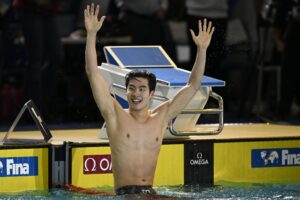
Hwang Sunwoo courtesy World Aquatics
Hwang came within 35 one-hundredths of Biedermann’s super-suited world record of 1:39.37, and became just the third man sub-1:40 in history, joining Biedermann and Frenchman Yannick Agnel, who clocked a time of 1:39.70 in 2012.
Not only did Hwang drop the third-fastest swim of all-time, but he also overcame an incredibly talented field to claim the gold medal, and did so while dealing with a broken finger.
This past summer, David Popovici became the first swimmer since 2009 to go sub-1:43 in the LCM 200 free. Hwang’s swim had a similar feel in many respects, and did so while outduelling Popovici himself, as the Romanian actually led the field through the first 50, 200 free Olympic gold medalist Tom Dean grabbed the lead at the halfway mark, and then Hwang took off, somehow keeping all eight of his 25-meter splits under 13 seconds.
Hwang, 19, had set a new Asian Record of 1:40.99 leading off South Korea’s 800 free relay, so he brought that mark down by well over a second, and added a new Championship Record as well, lowering Danas Rapsys‘ 1:40.95 from 2018.
Popovici couldn’t match Hwang’s explosion of speed on the third 50 and settled for second in 1:40.79, narrowly out-touching the third-place Dean (1:40.86).
Honorable Mentions:
- Nicholas Santos (BRA), 50 butterfly – The legendary 42-year-old Santos made it clear this was his retirement swim, and he came through by nearly matching the world record and winning his fourth career SC world title in the 50 fly and third in a row. Despite the field featuring former champion Chad Le Clos and co-world record holder Szebasztian Szabo, Santos won in definitive fashion by nearly two-tenths of a second, touching in 21.78. The Brazilian shares the world record of 21.75 with Szabo.
- Daiya Seto (JPN), 200 breaststroke – No individual world records fell on the men’s side in Melbourne, but Seto came incredibly close in the 200 breaststroke—an event he’s not generally known for on the international stage—as he challenged Kirill Prigoda‘s all-time mark of 2:00.16 with a blistering 2:00.35 performance. Seto’s swim makes him the second-fastest man ever, as he shattered the Asian Record previously held by Qin Haiyang (2:01.15), his own Japanese Record from 2017 (2:01.30), and beat runner-up Fink (2:01.60) by over a second.
- USA, 800 freestyle relay – It was a near-flawless performance for the American men in the 800 free relay, as the U.S. shattered the world record by over two and a half seconds of 6:44.12. Kieran Smith (1:41.04), Carson Foster (1:40.48), Trenton Julian (1:41.44) and Drew Kibler (1:41.16) rolled to a dominant gold medal victory over Australia (6:46.54), which also went under the old world record and had the fastest relay split of all-time come from Kyle Chalmers (1:40.35).
Race of the Meet: 400 Medley Relay
World record? Check. Epic three-team battle? Check. Oh, and tie for gold, so two teams and eight swimmers share the world record? Check!
It was a fitting conclusion to six action-packed days in Melbourne, as the top three teams at the competition—USA, Australia, and Italy—locked horns in the final event of the meet: the men’s 400 medley relay.
The race had a bit of everything, including yet another duel between Ryan Murphy and Isaac Cooper after the 50 back controversy, and it was Murphy putting the U.S. in the lead early with an opening leg of 48.96.
Cooper, to his credit, had his fastest 100 back performance of the meet (and his career) in 49.46 to keep Australia within half a second, while Lorenzo Mora was 49.48 for the Italians.
Nic Fink continued his hot streak with a blistering 54.88 breaststroke split to put the U.S. in the driver’s seat, up by more than a second on Italy and more than two on Australia at the halfway mark.
Matt Temple (48.34) and Matteo Rivolta (48.50) produced monster fly legs to make up ground on Trenton Julian (49.19), but the U.S. still held a thin lead on Italy going into the anchor leg, with Australia back by 1.32 seconds.
The U.S. gave anchor duties to Kieran Smith, who was looking for some redemption after missing the 200 free final by one-tenth of a second earlier in the day. The Italians had Alessandro Miressi, the 2021 SC world champion in the 100 free, and the Aussies had, of course, Kyle Chalmers, the world record holder, newly-minted SC world champion and one of the most clutch relay performers of this era.
It looked as though it would come down to Smith and Miressi, but Chalmers slowly but surely closed the gap, and coming down the final 10 meters it was anyone’s race.
After a chaotic finish, the clock showed that it was a tie: 3:18.98 for the United States, 3:18.98 for Australia, both under the world record of 3:19.16 set by Russia way back in 2009. The Italians were also under the 13-year-old world record in 3:19.06, but settled for bronze.
Chalmers recorded a 44.63 split on the end (compared to Smith’s 45.95 and Miressi’s 45.56), which was the fastest in history. Fink’s breaststroke split stands #2 all-time behind Adam Peaty (54.84), and Temple’s fly leg ranks seventh.
Breakout Performer Of The Meet: Jordan Crooks, Cayman Islands
Jordan Crooks crashed down the NCAA door in the latter half of last year and went on to have a sensational freshman campaign at the University of Tennessee, becoming the fastest first-year swimmer ever in the 50-yard freestyle.
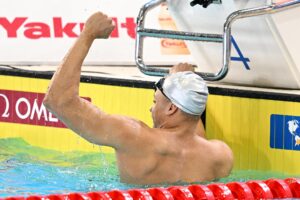
Jordan Crooks courtesy World Aquatics
That momentum has only picked up steam since the beginning of the 2022-23 collegiate season, but Crooks, a native of the Cayman Islands, had yet to really make his presence known outside of college swimming circles coming into these World Championships.
He finished 78th in the men’s 100 free and 59th in the 200 free at the 2019 LC Worlds in Gwangju, and at the 2022 edition this summer in Budapest, he showed marked improvement, placing 19th in the 50 free and 21st in the 100 free.
But his clear natural talent for short course, plus the skills he’s honed over the last 15 months in Knoxville, were put on display last week in Melbourne and elevated him from near-semi-finalist at LC Worlds to gold medal favorite.
The 20-year-old wasted no time in establishing himself as a frontrunner in the sprint free events, taking the top seed out of the prelims of the men’s 100 free with a blistering time and new national record of 45.61.
He followed up by claiming the top seed out of the semis (45.55), and then went on to lead the final through 75 meters before falling down into a tie for sixth (45.77) in an ultra-competitive heat.
Crooks didn’t let that result shake his confidence, holding nothing back through the three rounds of the 50 free, taking the top seed in the heats (20.36) and semis (20.31), with the latter swim tying him for fourth all-time as he qualified 45 one-hundredths clear of second-place Ben Proud.
Proud, the defending champion, posed a considerable threat to Crooks in the final, but he didn’t flinch. Crooks put it all on the line and emerged with the gold medal in a time of 20.46, just .03 ahead of Proud (20.49).
Crooks’ victory was the first gold medal for the Cayman Islands at the World Championships, a monumental feat, and establishes him as someone to watch in the sprints at every international competition moving forward.
Honorable Mentions:
- Isaac Cooper, Australia – Cooper bounced back from a difficult summer to have a breakout showing in front of the home crowd in Melbourne, as the Australian won a pair of individual medals and added three more on relays, including setting a new World Junior Record in the men’s 50 back semi-finals (22.52). Cooper’s time from the semis was faster than what Murphy would end up claiming gold with in the final, which also came after Cooper beat Murphy head-to-head prior to the event having to be re-swum. Cooper also won bronze individually in the 100 back (49.52), and then went even faster on the lead-off leg of Australia’s 400 medley relay (49.46) that ultimately tied with the U.S. for gold and set a new world record. The 18-year-old added a second gold medal after leading off the Australian men’s 200 free relay in 21.25, showing he’s not just a backstroker, and kept the Aussies at the front of the race in the 200 medley relay with a 50 back lead-off of 22.66 as they ultimately won bronze.
- Ilya Kharun, Canada – Kharun has long been a highly-regarded swimmer in the U.S. club system, but since his sporting citizenship changed over to Canada earlier this year, he’s really taken the next step and become an international player. After breaking numerous Canadian Records in the men’s butterfly events on the FINA World Cup circuit, the 17-year-old continued to do so in Melbourne. He broke both the Canadian and World Junior Record in the 50 fly prelims (22.32) and semis (22.28), and then matched that semi time in a swim-off loss to Estonian Daniel Zaitsev. Kharun then reset the Canadian Record three times in the 100 fly, culminating with a World Junior Record and silver medal performance in the final where he incredibly turned eighth at the 75 before rallying to touch second in 49.03. He added a Canadian Record in the 200 fly prelims (1:50.86) before taking eighth in the final, and also won bronze on the Canadian mixed 200 medley relay. Overall, the Sandpipers of Nevada product contested 16 races in just six days.
18-and-Under Swimmer of the Meet: Isaac Cooper, Australia
There were three swimmers in contention for this award, but it was ultimately impossible to deny Cooper, who made his way onto the podium twice individually and three more times on relays.

Isaac Cooper courtesy World Aquatics
Cooper knocked a quarter of a second off Kliment Kolesnikov‘s World Junior Record with his semi-final swim of 22.52 in the 50 backstroke, and had it not been for a technical error, he might’ve walked away with the gold medal in the event.
Overall, Cooper went sub-23 in the 50 back five times at the meet, not including the initial final that had to be re-swum, went 49-mid twice in the 100 back, and also showed he can compete with the best in the 50 free, leading off the Aussie gold medal-winning 200 free relay.
Cooper has battled through a lot of adversity this year, and despite everything not going his way in Melbourne, he didn’t let it affect his performance as he stepped up time and time again for Australia and proved he’ll be a force to be reckoned with in the years to come.
Honorable Mentions:
- Ilya Kharun, Canada – At 17, Kharun’s time of 49.03 in the 100 fly took a half-second off the previous WJR held by Li Zhuhao, an incredible performance for many reasons. Not only did he rally from eighth to claim silver behind Chad Le Clos, but Kharun pulled that off at the tail-end of an incredibly busy competition where he raced 16 times in six days. He continued to rewrite the Canadian Record books in all three fly events, added another WJR in the 50 fly, and was very reliable for the Canadian relays, showing off his versatility in freestyle.
- David Popovici, Romania – Popovici openly said during the meet that he still “hates short course,” but he still performed well, although the gap between him and the rest of the world that exists in long course is negated in this format. The 18-year-old Romanian broke the World Junior Record in the 100 free (45.64), but found himself off the podium in fourth. He stepped things up with a monstrous showing in the 200 free, clocking 1:40.79 to near the WJR, but fell to friendly rival Hwang Sunwoo who dropped one of the fastest swims ever for gold (1:39.72). Popovici may not have come anywhere near the impossibly high bar he set this summer in the Olympic-sized pool, but his performances in Melbourne were still noteworthy, especially for someone who is still 18.
SwimSwam: SwimSwam’s Awards For The 2022 Short Course World Championships – Men’s Edition




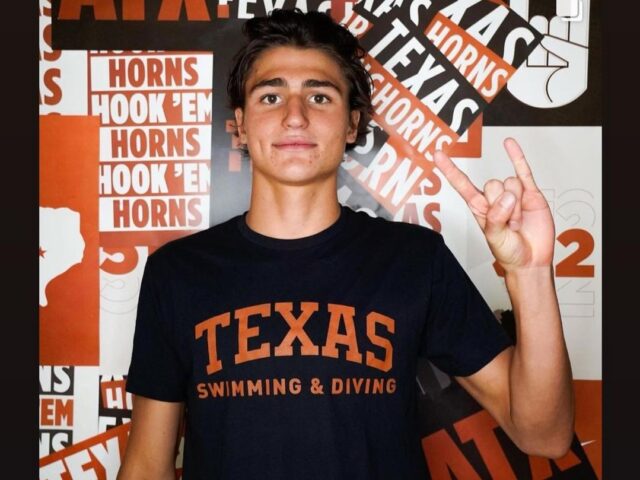
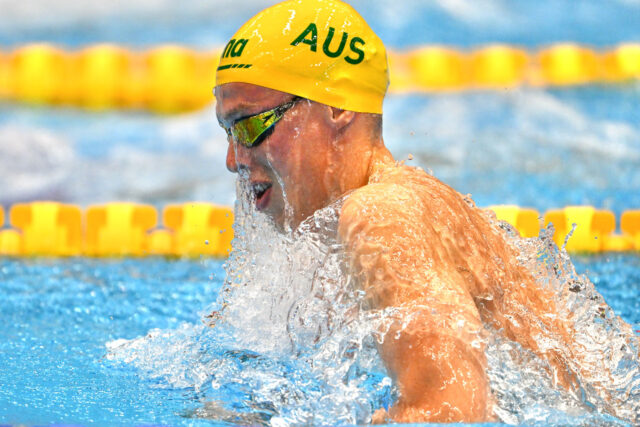












You must be logged in to post a comment Login